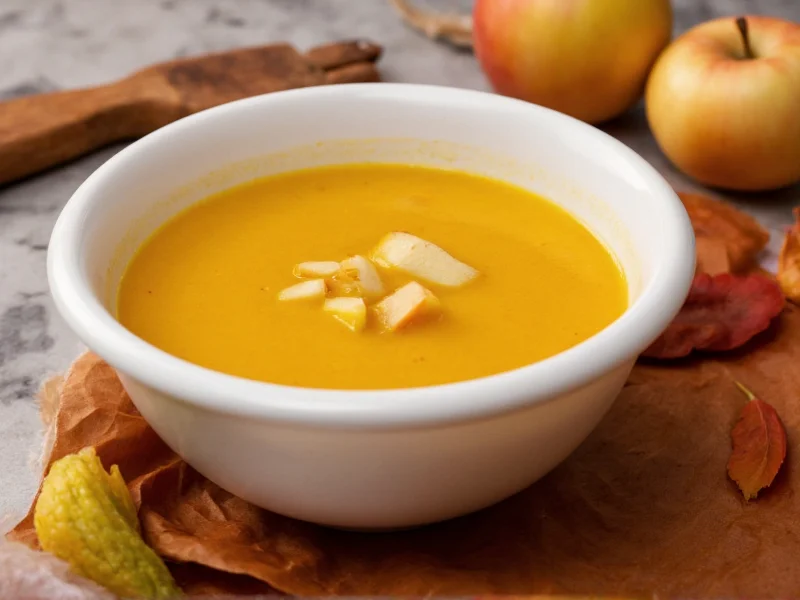Nothing captures autumn's essence quite like a steaming bowl of butternut apple soup. This seasonal favorite balances the natural sweetness of roasted butternut squash with the bright tartness of apples, creating a complex flavor profile that satisfies both comfort food cravings and nutritional needs. Professional chefs and home cooks alike praise this soup for its versatility—it works equally well as a starter for holiday dinners or a weeknight meal when time is limited.
The Perfect Flavor Balance
What makes butternut apple soup exceptional is how the ingredients complement each other. Butternut squash provides earthy sweetness and creamy texture when cooked, while apples add necessary acidity that prevents the soup from becoming cloying. The best varieties for this easy butternut apple soup recipe include Honeycrisp or Granny Smith apples, which maintain their structure during cooking while contributing distinct flavor notes.
Essential Ingredients Explained
Understanding why each component matters helps you create a superior soup. Don't underestimate the importance of quality ingredients when preparing this healthy butternut squash and apple soup.
| Ingredient | Why It Matters | Substitution Options |
|---|---|---|
| Butternut squash (2 lbs) | Provides natural sweetness and creamy base | Acorn squash or pumpkin |
| Apples (2 medium) | Adds bright acidity and complexity | Pears for milder flavor |
| Fresh sage (3-4 leaves) | Earthy note that complements squash | Thyme or rosemary |
| Yellow onion (1 medium) | Creates flavor foundation | Shallots for sweeter profile |
| Vegetable broth (4 cups) | Provides depth without overpowering | Chicken broth for non-vegetarian |
Step-by-Step Preparation Guide
Follow these steps for a flawless creamy butternut apple soup without cream that still delivers luxurious texture:
- Prep vegetables: Peel and cube butternut squash (about 4 cups), peel and chop apples, dice onion
- Roast squash: Toss squash with olive oil, salt, and pepper; roast at 400°F for 25 minutes until tender
- Sauté aromatics: Cook onions in olive oil until translucent, add minced garlic and chopped sage
- Combine ingredients: Add roasted squash, chopped apples, and vegetable broth to pot
- Simmer: Cook 15-20 minutes until apples are tender
- Blend: Use immersion blender for smooth texture (or regular blender in batches)
- Season: Adjust salt, pepper, and add touch of apple cider vinegar for brightness
Pro Tips for Perfect Results
Avoid common pitfalls with these professional recommendations for your butternut squash soup with apples and sage:
- Don't skip roasting: Roasting squash deepens flavor significantly compared to boiling
- Balance acidity: A splash of apple cider vinegar at the end brightens flavors without making soup tart
- Texture control: For extra smooth soup, strain through fine mesh sieve after blending
- Cream alternatives: For dairy-free creaminess, blend in 1/4 cup cooked white beans or coconut milk
- Flavor development: Let soup rest 30 minutes before serving—flavors improve significantly
Variations to Explore
Customize your vegan butternut apple soup recipe based on dietary needs and preferences:
- Spiced version: Add 1/2 teaspoon each of cinnamon, nutmeg, and ginger for holiday flair
- Protein boost: Stir in 1/2 cup cooked lentils or white beans before serving
- Smoky twist: Add 1/4 teaspoon smoked paprika for depth
- Curried variation: Include 1 tablespoon curry powder for an unexpected flavor dimension
- Crunchy topping: Garnish with toasted pumpkin seeds or crumbled bacon for texture contrast
Serving and Storage Guidelines
Maximize enjoyment with proper presentation and understand butternut squash apple soup storage tips:
Serve hot with a drizzle of coconut milk or olive oil and fresh sage leaves. This soup pairs beautifully with crusty bread, a simple green salad, or as a starter before roasted chicken. For meal prep enthusiasts, this butternut squash apple soup from scratch stores exceptionally well.
Refrigerate in airtight containers for up to 5 days or freeze for up to 3 months. When reheating, add a splash of broth if needed to restore ideal consistency. The flavors actually deepen when stored overnight, making this an excellent make-ahead option for busy schedules.
What are the best apples for butternut squash soup?
Honeycrisp and Granny Smith apples work best in butternut squash soup. Honeycrisp provides balanced sweetness with mild tartness that holds up during cooking, while Granny Smith offers brighter acidity that cuts through the squash's richness. Avoid softer varieties like Red Delicious that become too mushy.
Can I make butternut apple soup without an immersion blender?
Yes, you can make butternut apple soup without an immersion blender. Transfer cooled soup in batches to a regular blender, filling only halfway and removing the center cap to allow steam to escape. Cover with a towel and blend until smooth. Alternatively, use a food mill for a slightly textured but still smooth result.
How do I fix butternut apple soup that's too sweet?
If your butternut apple soup is too sweet, balance it with acidity rather than diluting. Add 1-2 teaspoons of apple cider vinegar or lemon juice, which enhances other flavors without making the soup taste sour. A pinch of cayenne pepper or smoked paprika can also counteract excessive sweetness through contrast.
Is butternut apple soup healthy?
Butternut apple soup is highly nutritious, packed with vitamins A and C from the squash, fiber from both main ingredients, and antioxidants from the apples. It's naturally low in fat and calories when prepared without cream. One serving typically contains about 150-200 calories, making it an excellent choice for weight management and overall health.











 浙公网安备
33010002000092号
浙公网安备
33010002000092号 浙B2-20120091-4
浙B2-20120091-4